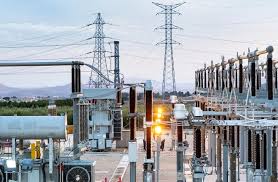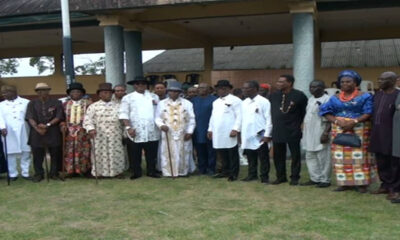Business
PETROAN Tasks NNPC On Accountability, Transparency In Operations …Wants 3m Barrels Reserved For Future Domestic …Oppose Repair Of PH Refinery
The Petroleum Products Retail Outlets Association of Nigeria (PETROAN) has urged the new management of the Nigerian National Petroleum Company Limited (NNPC) to be transparent in its operations to disabuse the minds of Nigerians who see the national oil company as overly opaque.
The National President, PETROAN, Dr. Billy Gillis-Harry, who made this known while speaking on Channels Television, argued that the NNPC has over the years created an environment wherein Nigerians are always suspicious of the organisation, advising the company to keep its books open henceforth.
Gillis-Harry also decried the lack of access to adequate supply of crude oil by local refineries, calling on the authorities to work towards ensuring that in the coming years, 3 million barrels are reserved for the refineries that are springing up all over the country.
He called on the concerned government regulatory bodies including the Nigerian Upstream Petroleum Regulatory Commission (NUPRC), the Nigerian Midstream and Downstream Petroleum Regulatory Authority (NMDPRA) and the NNPC to ensure the workability of the proposal.
In his words, “NNPC has created that kind of environment where it’s now difficult for the public to trust them with anything. And I think it will be in the best interest, not just of the management, but of Nigeria, that that mindset should be changed by the current management.
“Bayo Ojulari is coming from the private sector, a very well-organised private sector, because he’s coming from a Shell background.
“So, I believe that he and his team, and Mr. Kida (Chairman), who is also coming from Total, have gone through a very regulated and very efficient system. And I think that they should bring that experience to bear on how the Nigerian oil industry should be.
“And NNPC should rise up from the doldrums and raise its head up and say, for so many years we didn’t do it right, but now we want to do it right. And I think that there is no time that is better than doing that”.
He reiterated some of the demands of the industry, which included raising crude oil production, transparent operations and creating a smooth relationship with host communities in the Niger Delta.
“Our demand is simple, which is that transparency should be key. The production of crude oil should be increased. We should be able to do as much as possible to make sure that the host communities of the Niger Delta are friendly, to encourage the businesses to come in”, he stated.
Gillis-Harry, however, aligned with the current divestments in the oil sector in Nigeria, expressing the view that indigenous companies are already taking over without any issues.
“We appeal that there should be a very special crude oil production plan for the local refineries, because with the number of refineries coming up in Nigeria, and hopefully with NNPC working hard to make their refineries work, Nigeria should be a refining hub, where we should then be earning additional foreign exchange by exporting refined petroleum products.
“So, we are looking at a situation where they should aim to keep 3 million barrels of Nigerian crude oil for refining in-country.
“And so, regardless of what has happened in the years where we hear that most of the crude oil that has not been even produced has been sold ahead for five years, errors could be made, and I think it takes people to see those errors and be able to ensure that they are corrected.
“So, I think that this management should start the revamping process, showing Nigerians the value and capacity that we have as a country to stand on our own and be the men and women that we should be, because we are leaders”, he said.
To ensure that there’s transparency in fuel pricing, Gillis-Harry said PETROAN was floating a platform to track and monitor the movement of prices and to make sure that the required industry data was made available to the public.
On the issue of the Port Harcourt refinery, the PETROAN boss stressed the need for transparency in the repairs stating that the association was willing to give the best support to Ojulari and his team.
He stated further that the temporary closure should be for the effective good and benefit of Nigerians, insisting that the 30 days timeline be adhered to.
“Right now, we cannot say for sure what is the progress (of work)”, he noted.
Business
Abia Takes Over Electricity Supply In 8 LGAs

Business
‘Gas Shortages, Infrastructure Deficiency, Bane Of Power Sector Growth’

Business
NUPRC Blames Out Service Trunk Lines On Vandalism … As Rivers NUJ Promises Development Journalism

-

 News3 days ago
News3 days agoFubara Hails Wike Over UNIPORT Doctorate Award
-

 News3 days ago
News3 days agoBayelsa Mulls 33 LGs, Others … As House Comm’tte Holds Public Hearing
-

 Sports3 days ago
Sports3 days agoSchool of Legal Studies Wins CEAPOLY Sports Competition …As Science And Tech Wins Football Category
-

 Politics3 days ago
Politics3 days agoADC Alleges Intimidation Against Governors Willing To Join Party
-

 Editorial3 days ago
Editorial3 days agoUNIPORT @50: Celebrating Excellence
-

 News3 days ago
News3 days agoFG Partners Stakeholders To Boost Food, Nutrition Safety
-

 News3 days ago
News3 days agoPeace Returns To Rivers Community
-

 News3 days ago
News3 days agoRivers Remains Committed To Upholding NYSC Ideals -SSG


